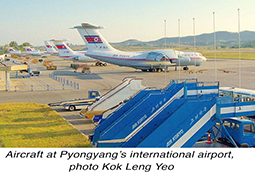Sanctions: They’re not just something on the TV news
- News Feed
- Tuesday, 20 June 2017
The UN Security Council has for the third time in 18 months voted to impose sanctions on the Democratic People’s Republic of Korea (North Korea). While these deal mainly with issues that will have limited impact on air cargo, it’s vital that the transport sector is aware of sanctions enforced by Australia, NZ and most of our major trading partners.
Failure to do so can potentially lead to prosecution, with a range of penalties available in sentencing. Even if an infringement does not extend to such extremes it can involve a shipper, forwarder, Customs broker or carrier in unwelcome documentation and quite probably in equally unwelcome scrutiny by border agencies for a long time.
 Australia’s Department of Foreign Affairs and Trade has a vast amount of detail about sanctions on its web site: www.dfat.gov.au
Australia’s Department of Foreign Affairs and Trade has a vast amount of detail about sanctions on its web site: www.dfat.gov.au
The number of countries covered by sanctions might come as a surprise. DFAT outlines the background to each and the obligations and responsibilities inherent in each.
Sometimes Australia opens its intention to sign up for or impose sanctions with public consultations to ensure there are no unintended consequences or unfairness. DPRK sanctions came under review late last year.
New Zealand has also been reminding shippers and the freight sector of their responsibilities, especially with the DPRK sanctions that came into effect on May 18.
A NZ Customs trade advisory noted “brokers are asked to take particular care with their entries to ensure correct country of origin, to avoid delays which may be caused by miscoding. Particular attention should be paid to the obligation on importers and exporters to present to Customs for inspection all goods which have originated in DPRK or are destined for DPRK.”
The advisory also explained that it wasn’t just a matter of importing goods from DPRK or exporting them there. The sanctions extend to goods that have “been brokered by or on behalf of the Government of DPRK, a national of DPRK or a designated person.”
And, it stressed, they covered goods “that have been carried on or are to be carried on a ship that is registered in DPRK or uses the DPRK flag; or an aircraft registered in DPRK”.
The Kiwis are a tad sensitive about air cargo and the DPRK. In December 2009 a Georgia-registered Il 76 freighter was stopped at Bangkok’s Don Mueang Airport and found to be full of explosives, anti-aircraft missiles and other armaments originating from DPRK.
As we reported at the time, the crew alleged they knew nothing of their “mysterious” cargo, weren’t sure where they were bound and even who their client was. They were a bit hazy about who owned or operated the freighter, too.
Embarrassingly for NZ, the client turned out to be an Auckland-registered company, one of hundreds that had been used in recent years for grey market trading and cargo movements.
NZ has since tightened the hitherto loose company registration regime although some critics allege the regulatory regime remains full of loopholes.
- Kelvin King










